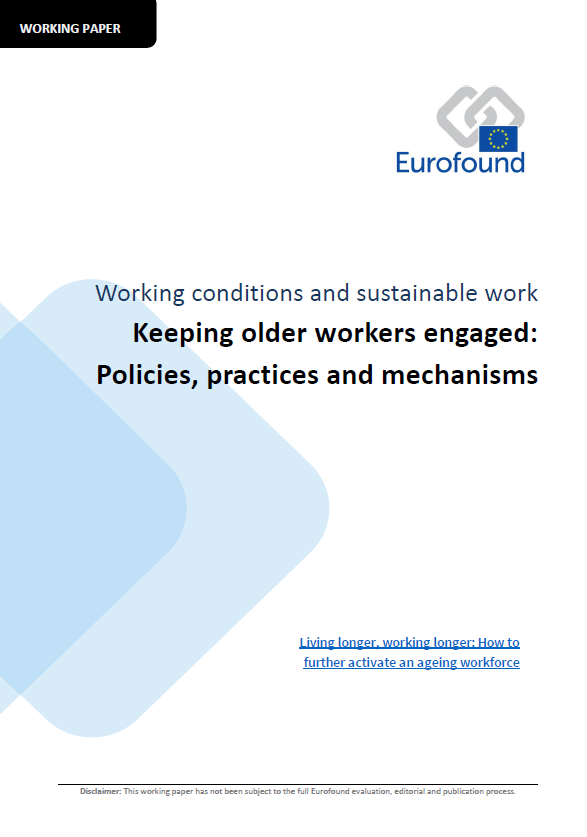EU context
Nonostante la crescita significativa dei tassi di occupazione dei lavoratori anziani negli ultimi dieci anni in molti paesi dell’UE, la relazione congiunta sull’occupazione 2017 della Commissione europea sottolinea che è possibile aumentare ulteriormente tali tassi. Nel 2016, il tasso di occupazione dei lavoratori anziani di età compresa tra i 55 e i 64 anni nell’UE si è attestato al 55,3 %, rispetto al 66,6 % di quelli di età compresa tra i 15 e i 64 anni, ove l’aumento maggiore si è registrato tra le donne.
Il pilastro europeo dei diritti sociali delinea un quadro in base al quale i mercati del lavoro hanno la possibilità di meglio adattarsi alle nuove sfide promuovendo nel contempo l’equità e la solidarietà tra le generazioni e ribadendo il diritto a un ambiente di lavoro adeguato alle esigenze professionali dei lavoratori per consentire loro di prolungare la loro partecipazione al mercato del lavoro. Inoltre, il recente accordo autonomo delle parti sociali europee sull’invecchiamento attivo e l’approccio intergenerazionale costituiscono un impegno a facilitare per i lavoratori più anziani la partecipazione attiva e una protratta permanenza sul mercato del lavoro.
Il lavoro di Eurofound
Eurofound vanta una lunga esperienza nell’affrontare problematiche relative all’invecchiamento della forza lavoro. Dagli anni ’90 la ricerca si è concentrata sulla partecipazione al mercato del lavoro, sulle prestazioni lavorative, le condizioni di lavoro e le preferenze occupazionali dei lavoratori più anziani nel contesto politico del profilo demografico in evoluzione in Europa. Il lavoro si è incentrato anche sul sostegno pubblico e sulle iniziative a livello aziendale che promuovono l’occupazione dei lavoratori più anziani, prendendo in esame la situazione delle lavoratrici anziane ed evidenziando l’aumento dei tassi di occupazione per questo gruppo e la crescente proporzione della forza lavoro, specialmente nella fascia di età 55-64 anni.
Dati dell’indagine
Le principali indagini di Eurofound forniscono una serie di dati sulla situazione dei lavoratori anziani. La sesta indagine europea sulle condizioni di lavoro (EWCS) esamina come i lavoratori anziani si posizionano tra le diverse dimensioni della qualità del lavoro. Sebbene abbiano meno probabilità di diventare disoccupati rispetto a quelli più giovani, i dati mostrano che i lavoratori più anziani hanno l’impressione che se diventassero disoccupati non troverebbero un nuovo lavoro con lo stesso trattamento economico e avrebbero persino difficoltà a rientrare nel mercato del lavoro.
Uno studio basato sulla quinta indagine europea sulle condizioni di lavoro (EWCS) esamina le caratteristiche della forza lavoro più anziana e del lavoro a diverse età nonché i fattori che rendono il lavoro sostenibile per una forza lavoro che invecchia: buone condizioni di lavoro, benessere fisico e mentale ed equilibrio tra vita professionale e vita privata.
L’indagine sulla qualità della vita in Europa di Eurofound (EQLS) presenta i risultati relativi all’età in relazione a varie dimensioni della qualità della vita in Europa. Un’analisi delle preferenze in materia di occupazione dopo i 50 anni, che si basa sulla terza EQLS, evidenzia che molti lavoratori anziani preferiscono lavorare meno ore anche dopo aver tenuto conto delle proprie esigenze finanziarie. Facilitare questo maggiore allineamento tra orario di lavoro e preferenze può consentire alle persone di lavorare più a lungo, motivandole in tal senso.
Vite professionali più lunghe
Di recente, Eurofound si è unita ad altre tre agenzie dell’UE per esaminare il lavoro “a misura di anziano” in Europa, le sfide politiche associate all’invecchiamento della forza lavoro e le soluzioni innovative.
Molti lavoratori non sono in grado di lavorare o sono demotivati a farlo fino all’età pensionabile prevista per legge. Tuttavia, c’è anche una fascia di persone in grado e disposte a lavorare anche dopo tale limite di età. Eurofound ha studiato questo fenomeno crescente rappresentato dalla ripresa del lavoro dopo il pensionamento.
La ricerca recente si è concentrata sul prolungamento della vita lavorativa attraverso schemi di pensionamento flessibili, esaminando in particolare schemi pensionistici parziali che possano contribuire a questo obiettivo. Anche le revisioni di metà carriera possono contribuire a prolungare la vita lavorativa. La ricerca ha esaminato come possono aiutare a chiarire le opzioni dei lavoratori per rimanere nel mondo del lavoro fino a un’età pensionabile successiva, mettendo in evidenza diversi strumenti sviluppati dalle aziende per far rimanere i lavoratori anziani.
Altre ricerche documentano le iniziative nazionali e settoriali da parte dei governi e delle parti sociali volte a far restare i lavoratori più anziani nel mercato del lavoro, compresi incentivi finanziari e condizioni migliori. In un progetto precedente, sono state analizzate le iniziative di gestione dell’invecchiamento introdotte prima e dopo la recessione per evidenziare le buone prassi nelle aziende in Europa.
Risorse
























